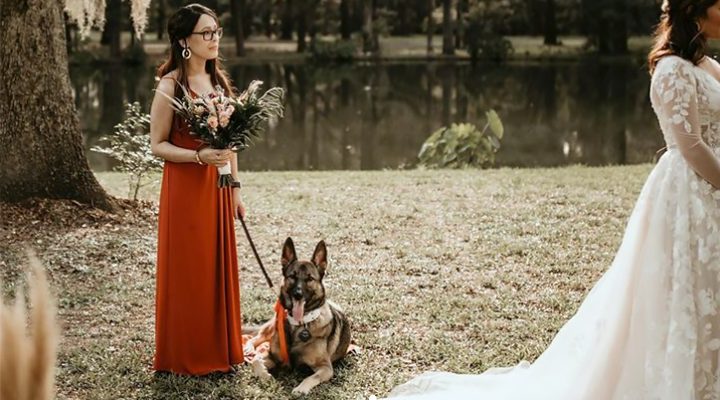
Sydnee Geril is 25, she lives in Ocala, Florida and has a 2-year-old German Shephard. Her name is Tulsa – after the beauty of Arizona (not Oklahoma). Sydnee adopted Tulsa off Craigslist in August of 2018. She decided she wanted a therapy dog of her own after spending time with them at Moffitt Cancer Center in Tampa, Florida during her chemotherapy appointments. Sydnee received her diagnosis for a rare form of bone cancer in October of 2017. And while the journey has brought pain and heartache, Tulsa has become a guiding light for Sydnee that fills her heart – and her life – with joy.
From Therapy Dog Tulsa to Service Dog Tulsa
Tulsa came to her furever home when Sydnee celebrated remission, 9 months after she was diagnosed. “I actually got Tulsa when I first went into remission in August of 2018 as a gift to myself. She was only 8 weeks old and was meant to help me keep active and stay motivated in my recovery. She proved to be so much more than that when I relapsed in February of 2019.”
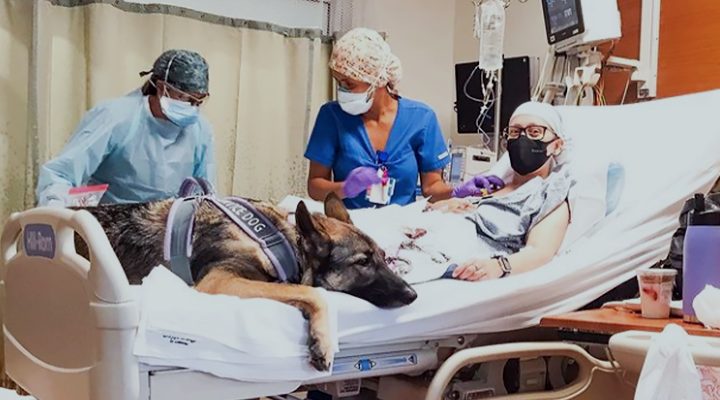
When Sydnee’s chemotherapy treatment began again, this time with Tulsa by her side, she noticed a new trick Tulsa picked up. “Tulsa began to pick up on when I would go through certain medical episodes.” What she was seeing was Tulsa’s reaction to Sydnee about to pass out.
Sydnee saw the importance of Tulsa’s special new trick. She began looking into getting Tulsa trained as a medical alert service dog. This required a much larger time commitment than therapy dog training. But it would allow Tulsa to look after Sydnee and potentially save her life.
How Are Service Dogs Different Than Therapy Dogs?
According to the American Kennel Club, Therapy dogs are trained to volunteer in clinical settings, such as hospitals or schools to provide comfort, while service dogs are trained to support and help individuals with disabilities. They have to perform specific tasks that lessen the impact of their person’s disability. Service dog training generally takes about two years and the dog learns how to cater to its owner’s personal needs. As a medical alert and mobility service dog, Tulsa alerts Sydnee before she faints.
“She is trained to alert me before I pass out. She was scent trained to detect the episode before it occurs, then alert me by putting her paw on my leg. This allows me enough time to sit, lay down, or get somewhere safe to prevent injury.”
Additionally, Tulsa helps out when it comes to Sydnee’s mobility. When the chemotherapy takes a toll on her body, Tulsa is trained to help in a variety of ways like:
- provide balance while walking,
- help her get up from sitting,
- retrieve medications, drinks, or dropped items,
- close doors,
- lead her to her car,
- and many other tasks.
Because of Tulsa’s incredible abilities and training, Sydnee can do so more with her by her side than she’d ever imagined. She helps her lead a healthier, happier life by allowing her more opportunities to be active and social.
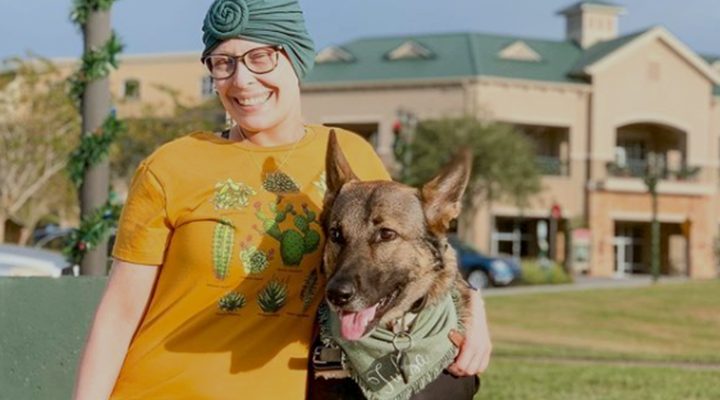
“I can go out in public on my own without worrying about passing out. I can walk around a store and shop with her help. And I’m overall able to push myself a bit harder than normal, because I know she is there to help when I need it. One of my biggest accomplishments with was being able to get through an airport and travel!”
Sydnee and Tulsa maintain trust and Tulsa’s training by working on it constantly. “We have short 5- to 10-minute training sessions most nights before bed. We also train while she is working, as well as make a point to go to new places when we can (COVID-19 has made this difficult), to keep her used to new environments.”
Our Emotional Bonds with Dogs
Dogs help reduce stress and loneliness, and they help us get more active, too. On top of all that, one of the most valuable gifts a dog like Tulsa provides is emotional support. “While emotional support is not a recognized task under the Americans with Disabilities Act, I feel all dogs provide emotional support, and Tulsa is no different,” says Sydnee.
Studies indicate that being around dogs lowers our blood pressure, calms or prevent panic attacks, and overall encourages more activity, movement, and wellness. Tulsa has ended up providing so much more for Sydnee than she originally thought possible.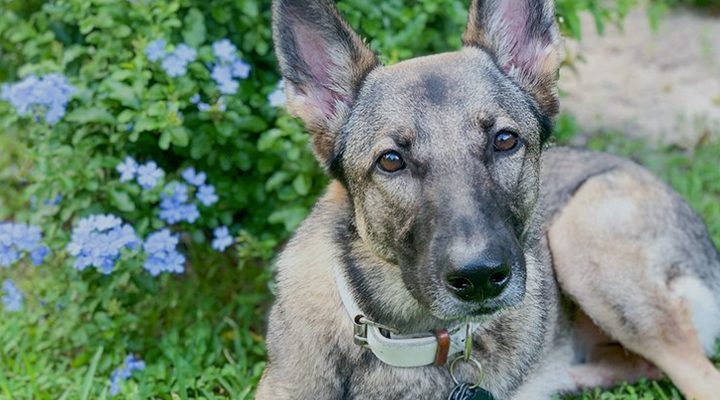
“She has helped me countless times. One time in particular, I was feeling bad from chemo, and was stuck in bed for a couple days. Tulsa snuggled with me the whole time. And for a young German Shepherd, who loves nothing more than playing and running around outside, that’s a big deal. She truly knows when I need some extra love to get through the hard days.”
Sydnee says she’s learned how incredibly helpful service dogs can be in improving someone’s quality of life. “Tulsa gave me my independence back. I can now go out alone in public without the constant fear of passing out.”
Service Dog PSA From Sydnee and Tulsa:
We asked Sydnee what she wants the world to know about service dogs, and this was her answer: “I want people to know how important service dogs are to their handlers. They are not just a cute accessory; they are a piece of medical equipment. Most people do not realize how dangerous it can be to distract a service dog by talking to them, petting them, etc.
These dogs are not robots. If they are distracted, even if just for a few seconds, they could miss an alert that could severely hurt their handler. I love talking or educating curious and respectful people about Tulsa, and service dogs in general! However, I wish more people knew that if I deny their request to pet her, I am doing it for my own safety, not to offend or upset them.”
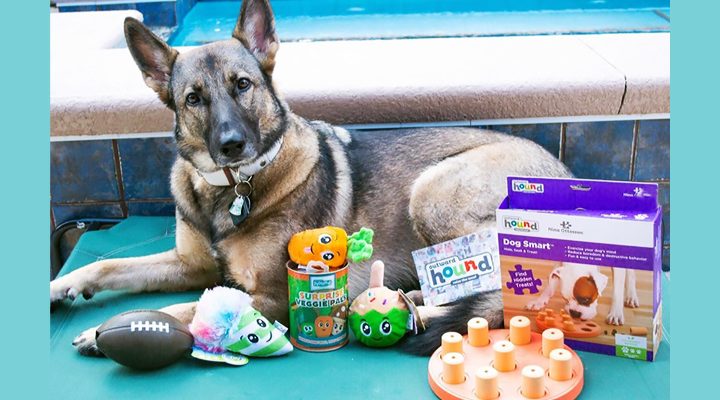
Did you know? There is no registry for service dogs. The only legal way to have one is to have a dog that is trained to perform a task that specifically helps with your disability.
Learn the right way to get a service dog from the American Kennel Clubs, “Service Dogs 101—Everything You Need to Know.”
More about Sydnee Geril
In her spare time, Sydnee runs an Etsy shop called Sunflower Shop Designs where she sells her sticker designs and branding work. Pop in and get your fix of Tulsa stickers! We were lucky enough to (virtually) meet Sydnee before the holidays this year and donated a bunch of our Christmas toys to her Sunflower Shop Designs advent calendar.
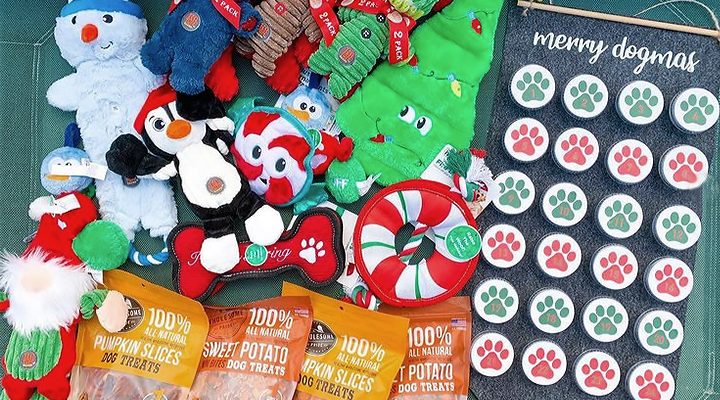
Be sure to follow Tulsa on Instagram at servicedogtulsa and Sydnee’s shop sunflower.shop.designs to support them moving forward! For more about our amazing stories about how dogs keep us healthy, check out:

